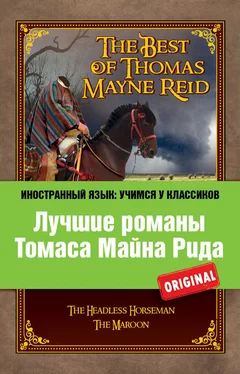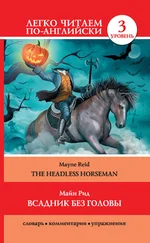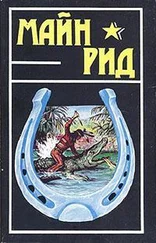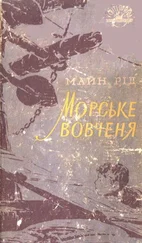It was not amidst these sculptured stones that Louise Poindexter practised her feats of archery; though more than once might she have been seen standing before the statue of Malinché, and scanning the voluptuous outline of the Indian maiden’s form; not with any severe thought of scorn, that this dark-skinned daughter of Eve [214] had succumbed to such a conqueror as Cortez.
The young creole felt, in her secret heart, that she had no right to throw a stone at that statue. To one less famed than Cortez – though in her estimation equally deserving of fame – she had surrendered what the great conquistador had won from Marina – her heart of hearts.
In her excursions with the bow, which were of diurnal occurrence, she strayed not among the statues. Her game was not there to be found; but under the shadow of tall trees that, keeping the curve of the river, formed a semicircular grove between it and the garden. Most of these trees were of indigenous growth – wild Chinas, mulberries, and pecans – that in the laying out of the grounds had been permitted to remain where Nature, perhaps some centuries ago, had scattered their seed.
It was under the leafy canopy of these fair forest trees the young Creole delighted to sit – or stray along the edge of the pellucid river, that rolled dreamily by.
Here she was free to be alone; which of late appeared to be her preference. Her father, in his sternest mood, could not have denied her so slight a privilege. If there was danger upon the outside prairie, there could be none within the garden – enclosed, as it was, by a river broad and deep, and a wall that could not have been scaled without the aid of a thirty-round ladder. So far from objecting to this solitary strolling, the planter appeared something more than satisfied that his daughter had taken to these tranquil habits; and the suspicions which he had conceived – not altogether without a cause – were becoming gradually dismissed from his mind.
After all he might have been misinformed? The tongue of scandal takes delight in torturing; and he may have been chosen as one of its victims? Or, perhaps, it was but a casual thing – the encounter of which he had been told, between his daughter and Maurice the mustanger? They may have met by accident in the chapparal? She could not well pass, without speaking to, the man who had twice rescued her from a dread danger. There might have been nothing in it, beyond the simple acknowledgment of her gratitude?
It looked well that she had, with such willingness, consented to relinquish her rides. It was but little in keeping with her usual custom, when crossed. Obedience to that particular command could not have been irksome; and argued innocence uncontaminated, virtue still intact.
So reasoned the fond father; who, beyond conjecture, was not permitted to scrutinise too closely the character of his child. In other lands, or in a different class of society, he might possibly have asked direct questions, and required direct answers to them. This is not the method upon the Mississippi; where a son of ten years old – a daughter of less than fifteen – would rebel against such scrutiny, and call it inquisition.
Still less might Woodley Poindexter strain the statutes of parental authority – the father of a Creole belle – for years used to that proud homage whose incense often stills, or altogether destroys, the simpler affections of the heart.
Though her father, and by law her controller, he knew to what a short length his power might extend, if exerted in opposition to her will. He was, therefore, satisfied with her late act of obedience – rejoiced to find that instead of continuing her reckless rides upon the prairie, she now contented herself within the range of the garden – with bow and arrow slaying the small birds that were so unlucky as to come under her aim.
Father of fifty years old, why reason in this foolish fashion? Have you forgotten your own youth – the thoughts that then inspired you – the deceits you practised under such inspiration – the counterfeits you assumed – the “stories” you told to cloak what, after all, may have been the noblest impulse of your nature?
The father of the fair Louise appeared to have become oblivious to recollections of this kind: for his early life was not without facts to have furnished them. They must have been forgotten, else he would have taken occasion to follow his daughter into the garden, and observe her – himself unobserved – while disporting herself in the shrubbery that bordered the river bank.
By doing so, he would have discovered that her disposition was not so cruel as may have been supposed. Instead of transfixing the innocent birds that fluttered in such foolish confidence around her, her greatest feat in archery appeared to be the impaling of a piece of paper upon the point of her arrow, and sending the shaft thus charged across the river, to fall harmlessly into a thicket on the opposite side.
He would have witnessed an exhibition still more singular. He would have seen the arrow thus spent – after a short interval, as if dissatisfied with the place into which it had been shot, and desirous of returning to the fair hand whence it had taken its departure – come back into the garden with the same, or a similar piece of paper, transfixed upon its shaft!
The thing might have appeared mysterious – even supernatural – to an observer unacquainted with the spirit and mechanism of that abnormal phenomenon. There was no observer of it save the two individuals who alternately bent the bow, shooting with a single arrow; and by them it was understood.
“Love laughs at locksmiths.” The old adage is scarce suited to Texas, where lock-making is an unknown trade.
“Where there’s a will, there’s a way,” expresses pretty much the same sentiment, appropriate to all time and every place. Never was it more correctly illustrated than in that exchange of bow-shots across the channel of the Leona.
Louise Poindexter had the will; Maurice Gerald had suggested the way.
Chapter 31 A Stream Cleverly Crossed
The sagittary correspondence could not last for long. They are but lukewarm lovers who can content themselves with a dialogue carried on at bowshot distance. Hearts brimful of passion must beat and burn together – in close proximity – each feeling the pulsation of the other. “If there be an Elysium [215] on earth, it is this!”
Maurice Gerald was not the man – nor Louise Poindexter the woman – to shun such a consummation.
It came to pass: not under the tell-tale light of the sun, but in the lone hour of midnight, when but the stars could have been witnesses of their social dereliction.
Twice had they stood together in that garden grove – twice had they exchanged love vows – under the steel-grey light of the stars; and a third interview had been arranged between them.
Little suspected the proud planter – perhaps prouder of his daughter than anything else he possessed – that she was daily engaged in an act of rebellion – the wildest against which parental authority may pronounce itself.
His own daughter – his only daughter – of the best blood of Southern aristocracy; beautiful, accomplished, everything to secure him a splendid alliance – holding nightly assignation with a horse-hunter!
Could he have but dreamt it when slumbering upon his soft couch, the dream would have startled him from his sleep like the call of the eternal trumpet!
He had no suspicion – not the slightest. The thing was too improbable – too monstrous, to have given cause for one. Its very monstrosity would have disarmed him, had the thought been suggested.
He had been pleased at his daughter’s compliance with his late injunctions; though he would have preferred her obeying them to the letter, and riding out in company with her brother or cousin – which she still declined to do. This, however, he did not insist upon. He could well concede so much to her caprice: since her staying at home could be no disadvantage to the cause that had prompted him to the stern counsel.
Читать дальше
Конец ознакомительного отрывка
Купить книгу











